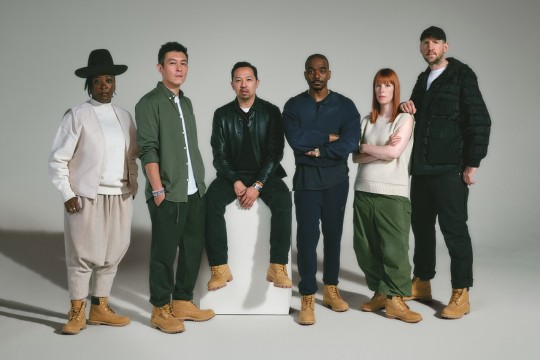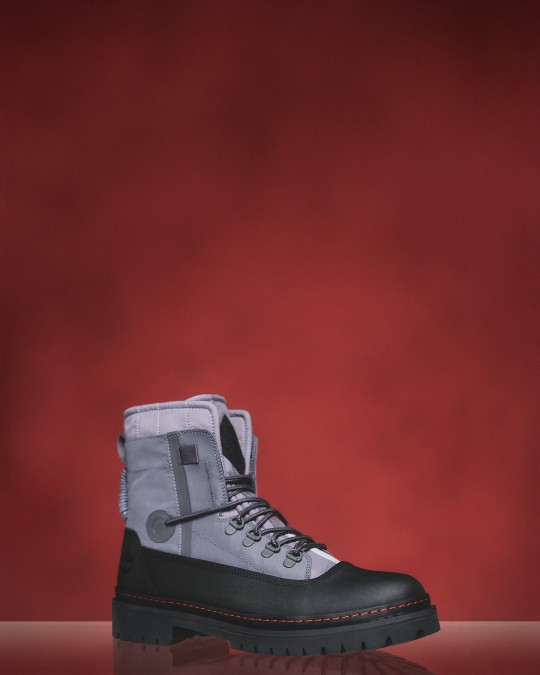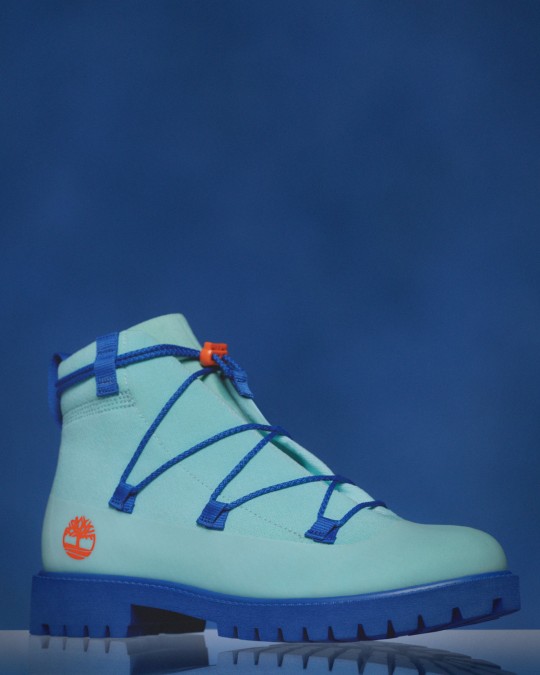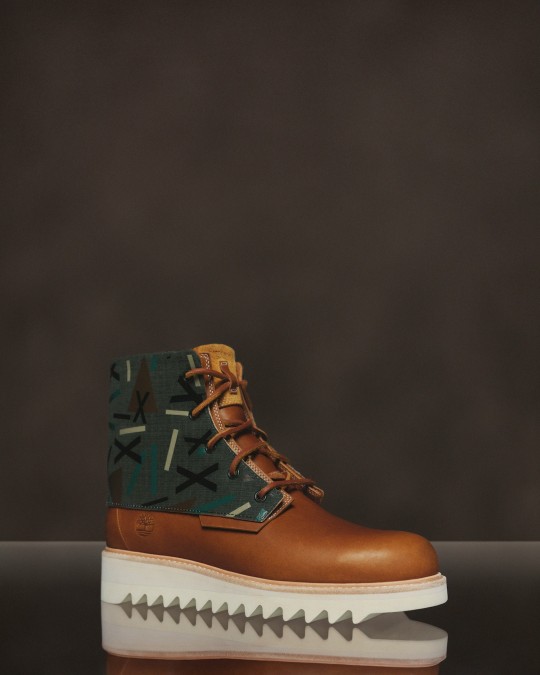#Samuel Ross x Timberland
Explore tagged Tumblr posts
Photo







When you hit the big 5-0, one celebration just doesn’t feel enough. Indeed, that’s the mentality that the team over at
Timberland
seem to have adopted, opting for a whole year’s worth of festivities around the 50th anniversary of its iconic 6-inch boot! Rather than parties, though, the global brand will be toasting its flagship footwear by way of a series of collaborations with a coterie of boundary-pushing creatives, spanning disciplines of art,
fashion
and design.
The news was announced today at Timberland’s campus in the heart of New Hampshire’s expansive – you guessed it – timberlands. Here, the brand unveiled Future73, a year-long initiative that sees six creatives put their distinct spin on the brand’s signature shoe:
Edison Chen
, Canadian-born Hong Kong actor-turned-creator and founder of streetwear and lifestyle brand
CLOT
;
Samuel Ross
, British designer and founder of
A-COLD-WALL*
;
Suzanne Oude Hengel
, Netherlands-based knit researcher and footwear innovator and founder of Knit In Motion;
Nina Chanel Abney
, Chicago-born, New York-based contemporary painter and artist;
Humberto Leon
, Los Angeles-based designer, retailer, creative director, restaurateur and co-founder of
Opening Ceremony
; and
Christopher Raeburn
, British designer and founder of his own responsible fashion label,
RAEBURN
.Working closely alongside Timberland’s design team, each was invited to reimagine the boot, drawing on the pioneering elements that have assured its icon status over the past half-century, and using their directional aesthetic sensibilities to propel it into the future. From Suzanne Oude Hengel’s incorporation of innovative knit techniques to Humberto Leon’s exaggerated chunky rubber soles and Christopher Raeburn’s wholly recyclable iteration, each proposes an irreverent, unexpected perspective on a boot that so many already know and love. ADVERTISEMENT
Samuel Ross' Future73 capsule
“From a cultural and historic standpoint, Timberland has always stood for craft, tension and durability,” mused Samuel Ross in a panel unpacking his Future73 capsule, which fused his yen for one-of-a-kind luxury sportswear with the American brand’s honed production capacities. “A-COLD-WALL tackles similar topics – we’ve always been interested in tensions, and the idea of recontextualising modern masculinity, which Timberland is an integral part of. That was a natural starting point, and from there, it was about trying not to repeat what Timberland had already produced – looking at how we could distort an icon, while also allowing it space to breathe.”It doesn’t all stop at the boot, though. In addition to the footwear offering, each Future73 designer has also created an accompanying clothing capsule – allowing for the holistic articulation of their respective creative visions – andthey’ve each created a second future-minded footwear design based on a Timberland silhouette of their choosing. “What an honour it has been to work alongside these amazing creative minds,” said Drieke Leenknegt, Chief Marketing Officer for Timberland. “Each has taken the Timberland Premium 6-inch boot and transformed it through the lens of their own bold innovation and design ethos, giving us a view of what the icon of the future might look like. It’s our legacy, with their vision, and together we’re forging new frontiers of boot culture.”
Needless to say, it’s all pretty damn exciting stuff, and the question that’s no doubt on your minds is: Where can I get my hands on it? Well, rather than spoil you by releasing all of these treats in one go, Timberland will be drip-feeding the Future73 releases between March and October of this year, with each capsule drop launched with a workshop-style event with the designers. The goodies themselves will then be available for purchase through Timberland, as well as through some of the most influential fashion and streetwear retailers worldwide. On your marks…
50 years ago, Timberland introduced its iconic “yellow boot,” officially known as the 6-Inch Boot these days. Though the company began as the Abington Shoe Company in 1952, the brand as we know it today was birthed in 1973 — the 6-Inch Boot was originally titled the “Timberland,” and it was so popular that the Abington Shoe Company decided to rename itself Timberland after its most popular product. Fast-forward a half-decade, and Timberland is a purveyor of some of the most iconic boots in the world of street culture today: besides the 6-Inch Boot, there’s the “40 Below” Boot, the Euro Hiker, the Field Boot and many more.
So how are they celebrating 50 years? By inviting a half-dozen world-class creatives to push their most iconic products in a fresh direction as part of a new Future 73 initiative. Timberland has tapped CLOT founder Edison Chen, A-COLD-WALL*founder Samuel Ross, fine artist Nina Chanel Abney, Opening Ceremony founder Humberto Leon, textile designer Suzanne Oude Hengel and designer/sustainability advocate/longtime partner Christopher Raeburn to give some of their most iconic styles a fresh spin, all of which were on display at the Future73 kickoff event at Timberland’s headquarters in Stratham, New Hampshire.
Timberland
Chen’s collaboration continues CLOT’s long-running mission of bridging Eastern and Western cultures with ancient Chinese script, tiger-inspired details and more across fully circular footwear and eco-friendly apparel. Samuel Ross’ creations show his knack for refined minimalism, adding by reducing. Nina Chanel Abney’s unique perspective on fine art and easygoing nature are on display across her footwear and apparel offerings. “I’m a footwear designer now!” she exclaimed with a laugh when discussing the parallels between her art practice and her steps into the footwear world.
Leon’s footwear designs play with proportion, exaggerating the most notable elements of the 6-Inch boot, while his apparel offers a unique take on modular function. Hengel’s knit creations offer beautiful tone and texture, exploring how far the scope of Timberland’s products can be expanded by completely changing their materials. And Raeburn continues his experimentation with found materials, noting that his designs drew from unique technical fabrics he found at a military surplus store and that he tried to imagine what the next 50 years would look like for Timberland while creating his products as well.
“Legacy is so important when you have an actual connection with a product,” Samuel Ross told Hypebeast at the Future73 launch event. “You feel like there’s even more responsibility there when you grew up loving something and you get a chance to create your own take on it.” Ross wasn’t the only designer to mention his personal connection to — and excitement around — working on Timberland’s icons. “This was a bucket list project for me,” said Nina Chanel Abney. “Coming in with a fresh perspective and reworking something as iconic as the 6-Inch Classic is a rare thing.”
“How do we take a piece of pop culture iconography and push it into the future?” – Humberto Leon
The Future73 collective’s footwear and apparel designs will roll out over the course of 2023, with exact release dates and further info to be announced in the coming weeks. It’s an undeniably massive project, one that’s equal parts past, present and future, and the partners were all on board with the task at hand. “How do we take a piece of pop culture iconography and push it into the future?” Humberto Leon said, recalling his design ethos when working on his collaboration. “I’ve been working with Timberland for almost 15 years, and there’s still so much to explore.”
And exploring is exactly what this initiative is about.
#timberland boots#Samuel ross#a cold wall#humberto leon#Nina Chanel abney#Christopher raeburn#streetwear blogging#footwear blog#footwear connoisseur#Suzanne Oude Hengel#timberland future 73 capsule#Edison Chen#Timberland Premium 6-inch boot#timberland collaborations#Edison Chen x Timberland#A cold wall x Timberland#Samuel Ross x Timberland#Suzanne Oude Hengel x Timberland#Nina Chanel Abney x Timberland#Humberto Leon x Timberland#Christopher Raeburn x Timberland
3 notes
·
View notes
Text
What Net-a-Porter’s Alibaba Deal Says About the Luxury E-Commerce Opportunity in China
Hello BoF Professionals, your exclusive 'This Week in Fashion' briefing is ready, with members-only analysis on the key topic of the week and a digest of the week's top news.
This week, Alibaba scored a major coup by signing Net-a-Porter onto Tmall’s Luxury Pavilion platform. The Richemont-owned e-commerce portal, the biggest online luxury fashion website by sales, will sit on the Luxury Pavilion, which is available through Tmall, and Alibaba will take over operations of Net-a-Porter’s Chinese app and help launch a Chinese version of Mr Porter, the luxury retailer's menswear sibling. To date, customers in China have only had access to an English-language version of the men's site.
The latest move signals several truths about China's fast-moving online luxury market. For one, the already powerful e-commerce platforms operated by Alibaba and JD.com are further consolidating their power in the luxury space. For Alibaba, scoring a deal with what is arguably the world’s most prestigious online luxury player is a big victory in its ongoing battle with arch-rival JD.com, which pumped $397 million into luxury fashion marketplace — and Net-a-Porter competitor — Farfetch last year.
The deal also puts pressure on the few remaining sceptics who refuse to partner with China’s e-commerce giants. Luxury executives like Gucci’s Marco Bizzarri — who earlier this month at the BoF China Summit remained steadfast in his decision to stay away from platforms like Alibaba’s Tmall — could start to feel more isolated. Going it alone increasingly looks like a tough sell in China’s fast-growing online luxury market. And while there are very legitimate concerns about counterfeits and ceding control to Chinese conglomerates, for more and more luxury players, the motto now seems to be: "If you can’t beat them, join them."
Yoox Net-a-Porter chief executive Federico Marchetti was quick to take to social media in the minutes following the announcement of Richemont’s Alibaba deal. “Winning in the Chinese luxury market means thinking big,” Marchetti posted on Instagram. But the bigger story seems to be that even the established e-commerce giants of Europe now have to plug and play into a much bigger digital ecosystem if they are to reach their potential in the Chinese market.
China’s major e-commerce platforms have made major strides in luxury e-commerce over the past 18 months. And since Richemont acquired YNAP for €2.7 billion (a little over $3 billion) in May of this year, the e-commerce group has made no secret of its desire to partner with a local player in order to grow its China business. YNAP has long seen great potential in the Middle Kingdom, but it hasn’t managed to break through with great success, despite several efforts at entry and revitalisation.
Yoox made its first foray into Chinese e-commerce in 2010 via the launch of Emporioarmani.cn, and followed with other own-brand sites and Yoox.cn in 2012. That same year, Net-a-Porter acquired Chinese luxury e-commerce player Shouke.com, which was relaunched as Theoutnet.cn, a Chinese-language version of Net-a-Porter’s discount sister site. That site was then integrated as a Chinese-language section of the global Theoutnet.com site in 2015 to the dismay of Chinese consumers, who complained the global site lacked integrated customs tariffs clearing and local payment options.
Of course, 2015 was also the year of the merger between Yoox and Net-a-Porter, creating the world’s largest fashion e-tailer. But even being the world’s biggest online luxury player didn’t seem to give the group a leg-up in China, where it struggled to localise and lure consumers away from dominant Chinese e-commerce platforms.
As e-commerce sales in China topped $1 trillion in 2017, international luxury brands still remained underrepresented on the country’s big digital platforms, which were driving much of the momentum in the Chinese online luxury market. According to Gartner L2, only 24 percent of luxury brands had official stores on Tmall (Alibaba’s B2C e-commerce platform) and only 10 percent operated them on JD.com as of June 2017.
The big shift in luxury e-commerce in China occurred when the two dominant B2C platforms, Tmall and JD.com, turned their attention more aggressively to the space with the launch of specialised platforms Toplife, a standalone app launched by JD.com in June 2017, and Luxury Pavilion, an “app-within-an-app” accessed by invite only through Alibaba’s Tmall platform, first launched in August last year. YNAP is the latest of more than 60 partners to align with Luxury Pavilion in its 14 months of existence.
The attraction for these brands is obvious: Alibaba’s pool of 600 million potential customers, closer alignment on anti-counterfeiting efforts across its platforms and access to the tech giant’s famed big data operation.
On the flip side, the move into luxury is, in many ways, a sensible evolution for Alibaba and JD.com, which already have dominant positions in the wider consumer market. In 2018 Alibaba’s platforms, which include Taobao and Tmall, will account for 58.2 percent of all retail e-commerce sales in China, while JD.com will capture a 16.3 percent share, according to Emarketer. But the blockbuster quarterly growth now expected by shareholders could only be sustained by growing average spend per transaction.
Conveniently, this pivot came not only as Chinese consumers were re-embracing luxury with a vengeance — figures from Bain & Company put luxury market growth in China up 20 percent last year — but also as the central government, which had been central to the country’s luxury downturn, following President Xi Jinping’s 2012 crackdown on conspicuous consumption, encouraged consumers to “upgrade” their consumption, in order to help move the Chinese economy away from its traditional manufacturing and exporting base towards a consumer-led model.
The scene is certainly set for blockbuster online luxury growth in China, with more than $20 billion of luxury goods sold in the country last year and e-commerce currently accounting for more than 28 percent of retail sales (and growing) in the country. What also now seems certain is that international players are increasingly positioning themselves to capitalise on this growth by aligning with dominant Chinese technology players — the only ones with meaningful market share, local knowledge and the logistical networks to make it happen.
THE NEWS IN BRIEF
BUSINESS AND THE ECONOMY
Source: Gucci
Strong sales growth at Gucci helps Kering beat forecasts. The French luxury conglomerate said revenue reached €3.4 billion in the third quarter and increased 27.5 percent on a comparable basis. Sales growth had been expected to slow more sharply from 31.5 percent a quarter earlier to the 22.5 percent rise forecast in a poll of analysts by Inquiry Financial. Shares in the group, which had been particularly hit in the past three months over worries Gucci was running out of steam, were up 8.2 percent.
Puma lifts outlook as basketball launch goes well. Third quarter sales rose a currency-adjusted 14 percent to €1.242 billion ($1.42 billion), while operating profit was up 28 percent to €130 million, beating average analyst forecasts for €1.2 billion and €119 million respectively. Puma saw sales rise almost 16 percent in the Americas in the quarter and 23 percent in Asia, showing little of cooling in the region even as concerns grow that a trade war will curb spending by Chinese shoppers.
Ferragamo shares jump as widow's death sparks takeover talk. The death of Wander Ferragamo has prompted speculation that her heirs may eventually sell their stakes in the Italian luxury shoemaker. The shares, which peaked in 2015, rose as much as 8.8 percent. She was a key member of the family shareholders who controlled the company, opposing any sale after the company was floated on the Milan stock exchange in 2011. While the brand has struggled to keep up profitability, it might still be attractive to buyers.
PEOPLE
Philip Green | Source: Shutterstock
Sir Philip Green named in Parliament as the businessman at centre of Britain's #MeToo scandal. The Topshop owner was identified by Lord Hain, the former Leader of the House of Commons, after two days of speculation over the name of the man behind the injunction. The former Labour cabinet minister said that he had been contacted by someone “intimately involved in the case” and felt a “duty” to reveal the name using parliamentary privilege. Following Lord Hain’s comments, there were calls for the billionaire to be stripped of his Knighthood and for a crackdown on the use of non-disclosure agreements by “serial offenders.”
Christopher Raeburn joins Timberland. He joins the VF Corporation-owned brand as global creative director. Raeburn, who also helms his namesake label, will share his time equally between his own brand and Timberland. He will be based in his London studio and his first collection for Timberland will be Autumn/Winter 2020.
Giles Deacon joins Aspinal of London. The accessories brand has named Deacon as design director, effective immediately. The appointment comes after a well-received collaboration on Giles x Aspinal capsule accessories. Deacon will continue to helm Giles Deacon Couture as creative director.
Marine Serre, Richard Quinn and more nominated for Fashion Awards 2018. The nominees have been revealed ahead of the December 10 ceremony at London’s Royal Albert Hall. They include household names such as Alessandro Michele for Gucci and Demna Gvasalia for Balenciaga to emerging designers like Craig Green, Martine Rose, Rejina Pyo and Samuel Ross for A-Cold-Wall*.
MEDIA & TECHNOLOGY
Amazon shares dip after sales miss. The e-commerce giant reported sales that missed analysts’ estimates, and issued a disappointing revenue forecast for the busy holiday quarter, suggesting it may be reaching a saturation point in the US. Revenue gained 29 percent to $56.6 billion in the third quarter. Analysts’ projected $57.1 billion. Sales will be from $66.5 billion to $72.5 billion in the current period, falling short of analysts’ average estimate of $73.8 billion.
Mytheresa launches kids. The Neiman Marcus-owned e-tailer is kicking off children’s clothing sales with 35 brands, including capsule collections from Gucci and Dolce & Gabbana. The new offering is targeted at existing Mytheresa customers, 40 percent of whom have children.
BoF Professional is your competitive advantage in a fast-changing fashion industry. Missed some BoF Professional exclusive features? Click here to browse the archive.
Source: https://www.businessoffashion.com/articles/professional/what-net-a-porters-alibaba-deal-says-about-the-luxury-e-commerce-opportunity-in-china
0 notes
Video
youtube
Timberland x Samuel Ross Future73 Collection | Timberland
#youtube#Timberland x Samuel Ross Future73 Collection#future73#timberland 50#timberland boots#timberland collaborations#footwear blog#streetwear collaborations
0 notes